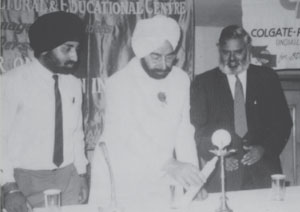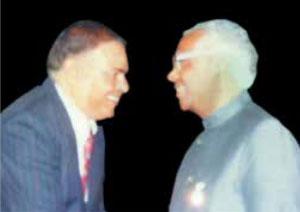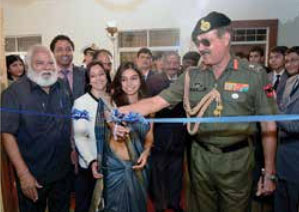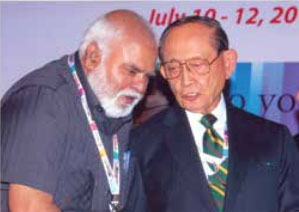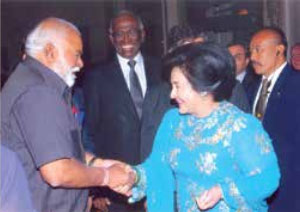From the Desk of Editor in Chief : Being Socially Conscious
As per the translation of the above verse in the Bhagvad Gita, Chapter 17, Verse 20, by Swami Mukundananda
(www.holy-bhagavad-gita.org), “Charity given to a worthy person simply because it is right to give, without
consideration of anything in return, at the proper time and in the proper place, is stated to be in the mode of goodness.’’
Despite retiring at a humble position in the Indian Army,
my voracious reading of books gave me the wisdom to
return something to society, which we exploit most of
the time.
But who am I? Not a government officer, nor
minister, nor Managing Director of a company. Despite
that, can’t I contribute in my own humble way? Is it not what the
Granthas
of every religion teach us? What is the use of reading them if we can’t follow
them to some extent, within our own limitations? What matters is the idea,
the thought and the determination to be philanthropic, despite having
modest earnings. Also, I never considered it as doing any favour, nor was I
yearning for anything in return, when I extended my arms for giving charity.
Before embarking on the narration of my pursuit of charitable causes,
I need to mention those persons to whom I owe everything. Firstly - the
officers in the Army under whom I served for 28 years as an Other Rank
(OR)/ Junior Commissioned Officer (JCO). They trained me in all situations
including how to fight wars against Pakistan. Secondly - Prof M S Pillai,
the then Head of Department (HoD) of the Symbiosis Institute of Business
Management (SIBM) and subsequently Founder Director of the Symbiosis Centre for Management and Human Resource (SCMHRD). He came all the
way to Nashik where I was posted, to convince me to take up teaching as a
career. Thirdly – Dr S B Mujumdar, who read my CV briefly and told me
(and I can never forget those two words), “Join straightaway”. Thereafter, he
looked after me, guided me, scolded me and even taught me how to shape
my career.
I always felt strongly about the plight of Defence personnel who lead
a sort of nomadic life, and as a result, their children face a tough time
educationally. India got Independence in1947, but neither the Central
nor State Governments bothered to address this issue, nor that of the
rehabilitation of defence personnel. As they are posted from place to place,
they do not officially belong to, nor come under the purview of any particular
state. Besides, there are issues of reservation, quotas and state policies. Can
you believe that, at one point of time, the total budget at the disposal of
the Director General – Resettlement, for the rehabilitation of one of the
biggest armies in the world was just Rs.50 lakh? Successive Governments
proclaimed to be custodians of the Armed Forces, but did precious little.
However, Prime Minister Narendra Modi is doing something positive,
notwithstanding the delay in the One Rank One Pension (OROP) scheme.
I, a small person from the Other Ranks, convinced Dr Mujumdar to
start the Symbiosis Institute of Management Studies (SIMS) for Defence
personnel and their dependents. I also initiated a proposal to procure four
acres of land from the Ministry of Defence. As the matter progressed, I left
SIMS and in my place, a dynamic and very young alumni, Ranjit Mudholkar,
took command. Nevertheless, I pursued the mission of getting the land,
and along with Ranjit, took the matter to its logical end. The then Defence
Minister George Fernandes appreciated the cause, referred it to the Central
Cabinet and got it approved. It was perhaps the first time that a Defence land
in the heart of the cantonment was given to a private B-School. I went a step
further and was the first to donate Rs.5 lakh as my contribution construction
of the SIMS building.
It is pertinent to note here, that, when I left SIMS, Dr Mujumdar, while
settling my accounts, was willing to give me a few lakh rupees for the good
work I had done for Symbiosis. However, I insisted that only my gratuity,
amounting to Rs.1.5 lakh be settled.
Also, as Director of SIMS, despite being the founder and having helped
procure land worth crores of rupees, my salary was only Rs.5000 per month
while my counterparts earned Rs.20,000 per month. But the disparity did
not bother me and I worked overtime because of the love and affection
showered by Dr. Mujumdar. My sponsorships also fall in the same category that of a selfless giver, without expectations.
I still felt I had not contributed enough for the cause of education of
Armed Forces personnel. So I created the Grateful Gunner’s Scholarship
in the Regiment of Artillery at a value of Rs.50 lakh. The interest is given as
scholarship to the children of the Regiment of Artillery.
I have not confined my donations only to children of the Armed
Forces. I have created similar corpuses in ten other colleges as well as public
charitable trusts, where similar scholarships are given in perpetuity.
I have also generously sponsored national corporate events, emanating
from my desire to change the pattern of sponsorships. I genuinely felt
that why should only industries be the sponsors? Why not educational
institutions, which ultimately benefit from the Industry? However, a stalwart
corporate leader commented that my sponsorships had a vested interest
and were in expectation of something in return. I immediately stopped the
sponsorship, as his remark hurt me to the hilt. I was distressed and felt that
my good intentions have not been appreciated by the enlightened leader. By
then, I must have donated to the tune of at least Rs.5 crore to this organisation
alone, over a period of one decade. Nevertheless, I am not discouraged. I
continue to do whatever I can, for I have to meet the commitment that I
have given to Lord Venkateshwara.
The objective of this editorial is to inspire people to make charity as an
integral part of their lives, as I firmly believe that it is one of the channels to
bridge the consistent problems of this country where dispensing of social
justice by the government is unbalanced. I am happy to mention that there
seems to be good news here. According to India Philanthropy Report,
2015 by Bain & Co, ‘‘in 2009, only 14% of the adult population across India
donated cash, and some 12% donated their time. However, in 2013, for
example, 28% of the adult population donated money and 21% donated
their time. This amounts to a staggering increase of more than 10 crore more
Indians making donations in cash or time than in 2009. What in 2009 was a
tiny sapling is now a resilient tree in bud, awaiting its first blooms.’’ Indeed
there is hope that social responsibility will be shouldered by every Indian,
who has the capacity to contribute in whatever, little way.
These are some of the questions that
bother me.
Dr (Col.) A. BAlASUBRANANIAN
editor-in-chief

